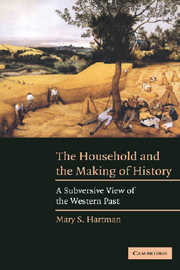This book argues that a unique late marriage pattern, discovered in the 1960s but originating in the Middle Ages, explains the continuing puzzle of why western Europe was the site of changes that, from about 1500, gave rise to the modern world. Contrary to views that credit upheavals from the late eighteenth century were reponsible for ushering in the contemporary global era, it contends that the roots of modern developments themselves are located in an event more than a millennium earlier, when the peasants in northwestern Europe began to marry their daughters almost as late as their sons. The appearance of this late marriage system, with its unstable nuclear household form, will also be shown to have exposed for the first time the common ingredients whose presence has perpetuated beliefs in the importance of gender difference and of a sexual hierarchy favoring males.
• A new social explanation for the rise of the modern world • Indispensable reading for anyone interested in the status of the modern family • Gives a new perspective to arguments on the contemporary gender order
Contents
1. How Northwestern Europe was strange: marriage, household, and history; 2. Marrying early and marrying late: divergent and parallel lives; 3. The riddle of the 'Western family patterns'; 4. The women and men of Montaillou and Salem Village: patterns of gender and power; 5. Communities in crisis: heresy, witchcraft, and the sexes in Montaillou and Salem; 6. What men and women want; 7. Interpreting the Western past with the women and the households left in, 1500–1800; 8. The late marriage household, the sexes, and the modern world.
Reviews
'This is a really exciting book, taking a bold stance about the nature of gender relations in Western society, and about the role gender relations played in a larger history. It's a big picture effort, by an imaginative scholar working from one of the key findings in comparative family history. It will cause debate, stimulate further reassessment - in general, do what an ambitious historical synthesis should do.' Peter Stearns, George Mason University
'… a brilliant if sometimes, at least in later chapters, contentious study …'. BBC History Magazine


